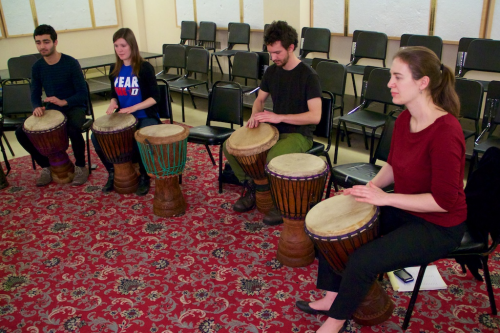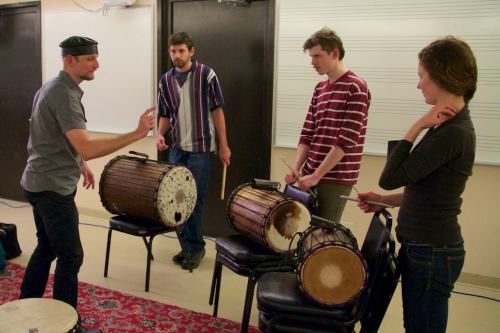Feb 25, 2013
‘Spirit of the drum’ beats deep in DePaul African Ensemble
‘Spirit of the drum’ beats deep in DePaul African Ensemble
CHICAGO — West African master drummer Babatunde Olatunji has been quoted as saying that “the spirit of the drum is something that you feel, but cannot put your hands on. It does something to you from the inside out.” It is this spirit that beats deep in DePaul University students who play in the African Ensemble at the School of Music.
Open to music majors as well as students from other disciplines, the DePaul African Ensemble is a collective of students who share an appreciation for African culture and music. Under the instruction of ensemble director Avo Randruut, the students come to experience the feel and sounds of traditional instruments like the djembe and dundun drums of Senegal, Mali and Guinea in the West African region. “We play a lot of the music of the Malinké people. What’s unique about the ensemble is a combination of hand drumming on the djembes and stick drumming on the dunduns, which are bass drums. We do pieces and arrangements based on traditional West African music,” explained Randruut. Djembes are rope-tuned skin-covered goblet drums and dunduns are a set of three different sized bass drums each producing a distinct pitch ranging from the smallest drum (kenkeni) with the highest pitch, to the middle one (sangban), to the largest drum (dununba), which has the lowest pitch. Randruut, an ethnomusicologist has studied with masters of several West African drumming traditions from the Malinké, Ewe, Dagbamba and Yoruba cultures. He uses those first-hand experiences when teaching the cultural context and traditional setting for the music. “Avo will often tell us stories of his experiences and he’ll tie in the cultural meaning of every song we learn,” said Madeline Faler, a senior majoring in music. “So for each song we learn what kind of ritual or festival it’s used for and in and which tribes will play it. It’s a real eye-opener,” she said. Katherine Brucher, an assistant professor of world music, described the significance of a group like this at DePaul. “I think the African Ensemble is a really important part of music education at DePaul because it gives our students a chance to expand their knowledge of musical traditions from other parts of the world, in this case, Sub-Saharan African and African diaspora cultures,” she said. “In addition to learning new instruments, performance techniques, and repertory, this ensemble really challenges students to learn music by ear through oral tradition and focus on playing as a cohesive group,” according to Brucher. African Ensemble member Peter Moxley, a senior majoring in communications, looks forward to his weekly drum sessions. “For two hours a week, I get to play drums. It’s really relaxing,” he said. “You learn about music as a language instead of as something written down. And that’s how a lot of this music is learned, spoken to other people. To learn music that way is really important, especially in a school that’s renowned for learning written music,” said Moxley. The weeks of learning and rehearsing will culminate in a free public concert by the DePaul African Ensemble at 8 p.m. March 6 at the DePaul Concert Hall, 800 W. Belden Ave., Chicago. Joining the DePaul African Ensemble will be guitarist Nathaniel Braddock, of the Occidental Brothers Dance Band International, as well as other guest musicians who will play African guitar music. “This concert will give people a chance to hear music that you don't get to hear every day here in Chicago,” said Brucher. “West African music is much more than just drumming, and this concert should be really exciting. The music will make you want to get up and dance.”

Established in 2005 in the School of Music, the DePaul African Ensemble allows music majors and other DePaul University student to further their understanding of music from Africa through the traditional beats, rhythms and sounds played on the djembe and other drums, says Katherine Brucher, assistant professor of world music. Practicing drum beats are, L-R, students Matthew Hannau, Rebekah Hastings and Christopher Misa, and faculty member Brucher. (Photo by Jon Cecero)

DePaul African Ensemble Director Avo Randruut, above left, instructs students in West African traditional rhythms during a rehearsal for their annual concert, scheduled this year for March 6 at 8 p.m. in DePaul Concert Hall. The ensemble will perform music from the Malinké people of Western Africa and will be joined by guitarist Nathanial Braddock of the Occidental Brothers Dance Band International. Pictured with Randruut are, L-R, Joshua Stern, Peter Moxley and Madeline Faler. (Photo by Jon Cecero)
